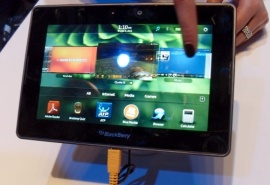RIM speaks on PlayBook's future in the UK

Research In Motion has yet to deliver its BlackBerry PlayBook, a standalone Wi-Fi connected tablet announced in September, into buyers' hands. But the company still took the opportunity of CES 2011 in January to unveil its plans for the second wave of PlayBooks, which include a 4G version bound for the US.
However, high-speed 4G networks — also known as LTE — are not expected to be up and running in the UK until at least 2015 due to operators' narrow profit margins and the infrastructure costs required for the new technology.
Given this time lag, ZDNet UK caught up with senior product manager Alex Kinsella at CES in Las Vegas to discuss RIM's tablet plans closer to home, and to find out what the company expects to gain for the PlayBook from its acquisition in December of user interface design and integration specialists The Astonishing Tribe.
Q: Do you have any launch date for any version of a PlayBook in the UK?
A: We haven't given out any timing. We said we're launching in the US in the first quarter of this year, and then it will roll out in other countries following that. You can draw conclusions that the UK is an important market for us; things tend to come out quite soon in the UK.

RIM's BlackBerry PlayBook will be launching in the US in the first quarter of 2011. Photo credit: Ben Woods
RIM said at CES 2011 that it will launch a 4G version in the US. But in the UK, 4G networks look to be about four years away. Do you have plans for a product to bridge that gap?
Obviously we don't comment on plans that far in the future. When we announced [the PlayBook], we said we were looking at doing a 3G/4G version.
With the current device, it's about having the full Wi-Fi. If you want 3G, then it's really easy to pair with your BlackBerry device over Bluetooth, which would give you that connectivity.
Why did RIM launch the PlayBook initially as Wi-Fi only and not in a 3G version?
It's really around the idea of not having two contracts. So, I have my 'professional-grade' product — and it's not that it's just for corporate executives, but BlackBerry is known for security.
We wanted a solution that addressed a number of issues, such as not having two kinds of BlackBerry, my email, calendar contacts, BlackBerry Messenger [and so on]. Pairing [a BlackBerry] over BlackBerry Bridge with a PlayBook allows me to have all that here.
But if you believe that having one contract and tethering is the answer, then why launch 3G and 4G versions?
Because there will be people that don't want to own a BlackBerry. There will be people that purely want a device that is not voice; consumption of data is way overtaking voice.
If you look at where a tablet fits into peoples' lives, it's rarely a replacement for a phone or a laptop — it's really a companion device. You have this compact powerful machine and it fits that bridge between laptop and smartphone. It's a device that fits really well within the portfolio.
Essentially, I'm asking whether it was quicker to get the PlayBook to market by not including mobile radios. The iPad was relatively alone in the tablet market until the recent Samsung Galaxy Tab launch; did that play into your decisions at all?
That wouldn't have been the reason. We wouldn't have sent this to market simply because it was easier or quicker [than including mobile radios]. It's stuff that, when we announced the 4G PlayBook, we said was in the pipe. It's purely around the fact that from a timing perspective, there's negotiations with carrier partners to consider.
Has RIM's purchase of The Astonishing Tribe (TAT) had any input on what we're seeing now with the PlayBook?
[The acquisition] was only a month ago, but you'll start to see more of that as we go through. The PlayBook is not a finished product, [as] we said this quarter, but it's evolving. With TAT, it's going to be amazing to see their impact, not just on PlayBook but on BlackBerry as a whole.
It's bringing great talent into the company. It adds a lot of value to RIM. In product management, there's always an equation of build, partner or buy. So you look at what you need to do and decide whether to build it yourself, partner up or buy someone that can help you do it. There are a lot of factors that go into that, and I think it was the right decision.
Why buy TAT though, rather than partnering with them?
We do acquire companies, but at the same time, they have a business. [We bought] Cellmania in California to help us extend App World even further, but they still have their day-to-day business that they have with other partners. Previous customers are still their customers. At the same time, they are now a core part of the BlackBerry App World.
Get the latest technology news and analysis, blogs and reviews delivered directly to your inbox with ZDNet UK's newsletters.